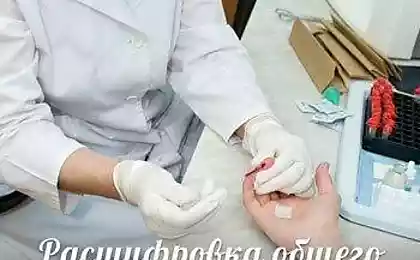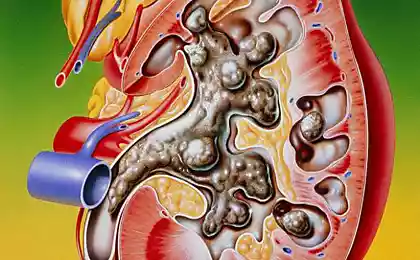1086
Defeated infection
Babbitt loves to blame doctors and scientists. Breakwater, doctors maim greater than treat, and what do the scientists do not understand. But it may very well be that, if not for science and medicine, this is not the average person would have grumbled and gently lay in a coffin. Mankind has always had to deal with infections and had never been able to treat them properly. Viruses and bacteria to the XIX century inclusive were the main agents of death. In the nineteenth century were vaccinated and immunology. In the last century, Fleming discovered penicillin. The problem moved from the field first in the mystical science, and then in the organization. Now most deadly infectious diseases treatable or preventable. Dying of them are now on their own stupidity and foolishness medical authorities
Smallpox
The disease is caused by the variola virus is transmitted from person to person by droplet infection. Patients covered by a rash, passing in as the ulcers on the skin and mucous internal organs. Mortality, depending on the virus strain, from 10 to 40 (sometimes even 70) percent.
What a victory. Smallpox - the only infectious disease completely annihilation of mankind. The history of struggle against it has no analogues.
It is not known how and when the virus began to torment people, but a few thousand years of its existence can vouch. First time rolls smallpox epidemics, but in the Middle Ages, has registered among people on a permanent basis. Only in Europe have died from it by half a million people a year.
Fight tried. Sharpness Indians in VIII century have realized that smallpox get sick only once in a lifetime, and then in humans produces immunity to the disease. Invented Variolation - infected from healthy patients with mild: rubbed pus from bubbles in the skin, in the nose. In Europe Variolation brought in the XVIII century.
But first, this vaccine was dangerous from her dying every fiftieth patient. Secondly, this virus infects people, the doctors themselves supported foci. In general, the thing is so controversial that some countries, such as France, it is officially banned.
May 14, 1796 English physician Edward Jenner rubbed in two cuts on the skin year-old boy, James Phipps contents bubbles with hands peasant Sarah white salmon. Sarah was ill with cowpox - a benign disease transmitted from cattle to people. July 1 doctor instilled in the boy smallpox, and smallpox did not catch on. From that time I began the story of the destruction of smallpox in the world.
Vaccinations vaccinia became practiced in many countries, and the term "vaccine" was introduced by Louis Pasteur - from the Latin vacca, «a cow." Nature gave people vaccinated: vaccinia virus provokes an immune response of the body as well as the variola virus.
The final plan for the destruction of smallpox in the world to develop Soviet doctors, and took it to the Assembly of the World Health Organization in 1967. This is something that the Soviet Union can bring his undoubted asset along with the flight of Gagarin and the victory over Nazi Germany.
By the time the foci of smallpox remained in Africa, Asia and several countries in Latin America. The first stage was the most expensive but also the most simple - vaccinated more people. The rate hit. In 1974, India was 188 thousand patients, and in 1975 - no, the last case was registered on May 24.
The second and final stage of the struggle - a search for a needle in a haystack. It was necessary to discover and suppress the individual pockets of the disease and to make sure that does not suffer from smallpox no one billions living on Earth.
Caught sick world. In Indonesia, we paid 5,000 rupees each, who will lead the patient to the doctor. In India, for it gave a thousand rupees, which is several times greater than the monthly earnings of the peasant. In Africa, the Americans conducted an operation "Crocodile": one hundred mobile teams in helicopters scoured the remote places like the ambulance. In 1976, the family of nomads out of 11 people infected with smallpox, hunted hundreds of medical helicopters and airplanes - find them somewhere on the border of Kenya and Ethiopia.
Oct. 22, 1977 in the town of Brand in southern Somalia to the doctor a young man complained of a headache and temperature. At first, he was diagnosed with "malaria", and a few days later - "chicken pox". However, WHO staff, examined the patient, found that he had smallpox. This was the last case of smallpox infection from a natural focus on the planet.
May 8, 1980 at the 33th session of the WHO officially declared smallpox eradicated in the world.
Today, viruses are found only in two laboratories: in Russia and the United States, the question of their destruction is postponed until 2014.
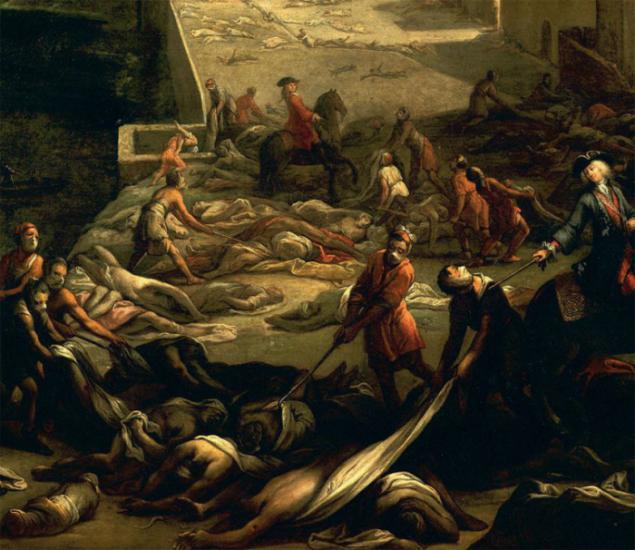
Plague
The disease caused by the bacterium Yersinia pestis Yersinia pestis. There are two main forms of plague: bubonic and pneumonic. The first affects the lymph nodes at the second - light. Without treatment a few days begins fever, sepsis, in most cases, death occurs.
What a victory. "The first case recorded July 26, 2009. The patient addressed to the doctor in critical condition and died on July 29th. 11 people who had contact with patients hospitalized with symptoms of fever, two of them died, the rest feel satisfactory "- something like this message from China, now looks information on outbreaks of the plague.
Message from any European city in 1348 would look like this: "In Avignon pestilence struck all, tens of thousands of them no survivors. The corpses from the streets to clean up non-who. " Total in the world during that pandemic killed between 40 and 60 million people.
The planet has experienced three pandemics plague "Justinian" 551-580 years, the "black death" 1346-1353 pandemic years and the late XIX - early XX century. Periodically flashed and local epidemics. With fighting disease and quarantine - in the era of late dobakterialnuyu - disinfecting dwellings carbolic acid.
The first vaccine at the end of the XIX century by Vladimir Khavkin - man fantastic biography, Odessa Jewish student Mechnikov, former Volya, three stints in prison and expelled from the policies of the University of Odessa. In 1889, after Mechnikov, he emigrated to Paris, where he got a job as a librarian at first, and then an assistant at the Institut Pasteur.
Khavkin vaccine doses used by tens of millions around the world up to 40-ies of XX century. In contrast to the smallpox vaccine, it can not destroy the disease, and the results were much worse: it reduces the incidence of 2-5 times, and the mortality rate at 10, but it is still used because there was nothing else.
This treatment appeared only after the Second World War, when Soviet doctors svezheizobretenny streptomycin used in the liquidation of the plague in Manchuria in the years 1945-1947.
Actually now used against plague streptomycin, all the same, and the population in the foci were immunized with a live vaccine developed in the 30s.
Today reported annually to 2, 5 thousand. Cases of plague. The mortality rate - 5.10%. For decades, no epidemics, no major outbreaks. It is difficult to say how serious role in this is the actual treatment, and how - a system to identify patients and their insulation. Because plague before people leave for decades.
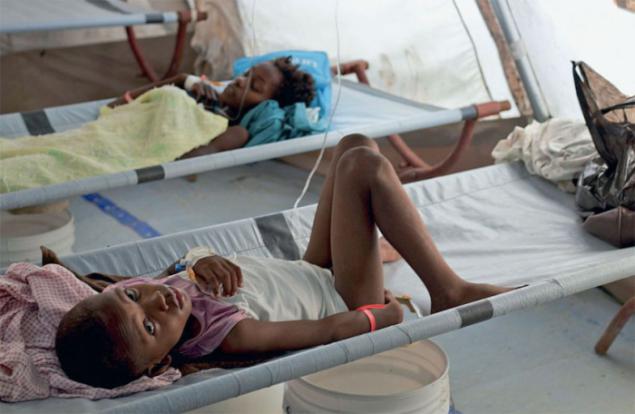
Cholera
The disease of dirty hands. Cholerae Vibrio cholerae Cholera is ingested with contaminated water or through contact with secretions of patients. The disease often does not develop at all, but 20% of infected people suffer from diarrhea, vomiting and dehydration.
What a victory. The disease was terrible. During the third pandemic of cholera in Russia in 1848, according to official statistics, noted 1,772,439 cases, of which 690 150 deaths. Flashed cholera riots when frightened people burned the hospital, believing doctors poisoners.
That's what Nikolai Leskov wrote: "When in the summer of 1892, at the end of the nineteenth century, there was cholera in the country, immediately there were the differences of opinion that we should do. The doctors said that it is necessary to kill a comma, and the people thought that it is necessary to kill the doctor. I should add that people are not the only way, "thought", but he tried and bring it into effect. Several doctors who tried to kill a comma for a better use of the case, were themselves killed. " Comma - Vibrio cholerae is open by Robert Koch in 1883.
Before the advent of antibiotic treatment of severe cholera existed, but still the same Vladimir Khavkin created in 1892 in Paris, very decent of warmed vaccine bacteria.
He experienced it for yourself and three friends, the People emigrants. Hawking decided that even though he is from Russia and escaped, but the vaccine has to help. If only allowed back. A letter with a proposal to establish a free vaccination was signed by Pasteur and Khavkin sent him curator of Russian science Prince Alexander of Oldenburg.
In Russia Khavkin, as usual, was not allowed, as a result, he went to India and in 1895 released a report on 42 thousands vaccinated and reducing mortality by 72%. Now in Bombay have Khavkin Institute (Haffkine Institute), what everyone can see it with the appropriate site. A vaccine, although the new generation has so far proposed by WHO as the main means of cholera outbreaks in it.
Today, every year several hundred thousand registered cases of cholera in endemic areas. In 2010, most cases were in Africa and Haiti. Mortality - 1, 2%, much lower than a century ago, and it is a merit of antibiotics. However, the main thing - prevention and hygiene.
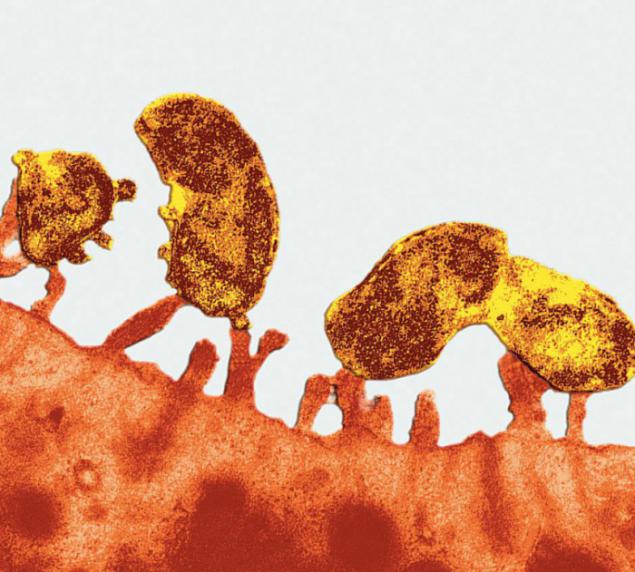
Ulcer
Disease lesions of the gastric mucosa and duodenal ulcer by the action of acid. Affecting up to 15% of people on the planet.
What a victory. The ulcer has always been considered a chronic disease: escalate - to receive medical treatment, waiting for the next exacerbation. And it was treated, respectively, reducing the acidity in the stomach.
Until two Australians in the early 80-ies of the last century, medicine has not turned so that is still at seminars opponents tear each other to shreds. (By the way, this is a common phenomenon in medicine: the introduction of a new treatment had not passed without controversy rigid. Fifty years after the widespread use of vaccinia virus, for example, has published the cartoons - people with horns growing after vaccination cowpox.)
Robin Warren worked as a pathologist at the Royal Perth Hospital in. For many years he molested medical statements that the stomachs of ulcer patients, he finds a colony of bacteria. The doctors ignored him, replying that no acid bacteria to multiply can not. Maybe he would have surrendered if not stubborn young intern Barry Marshall, who came to Warren with a proposal to cultivate bacteria and then prove their relationship with the ulcer.
The experiment from the beginning is not specified: the microbes in test tubes did not grow. Accidentally left them unattended for a long time - were the Easter holidays. And when the researchers went back to the lab, they found the colony grew. Marshall put the experiment spread the bacteria in meat broth, and drank it down with gastritis. He cure drug bismuth and the antibiotic metronidazole, completely destroying bacteria in the body. Dubbed the bacterium Helicobacter pylori.
It was also found that Helicobacter infected half to three-quarters of all humanity, but not all of it causes ulcers.
Marshall was extremely punching man, he managed to break the resistance of the medical community, who are used to that ulcer patients - the patient life. In 2005, Australians have received for his discovery of the Nobel Prize.
Today, the main circuit ulcer treatment is to destroy Helicobacter pylori antibiotics. However, it appeared that the plague may be caused by other factors, such as certain medications. About what percentage of all cases connected with bacteria, still argue.
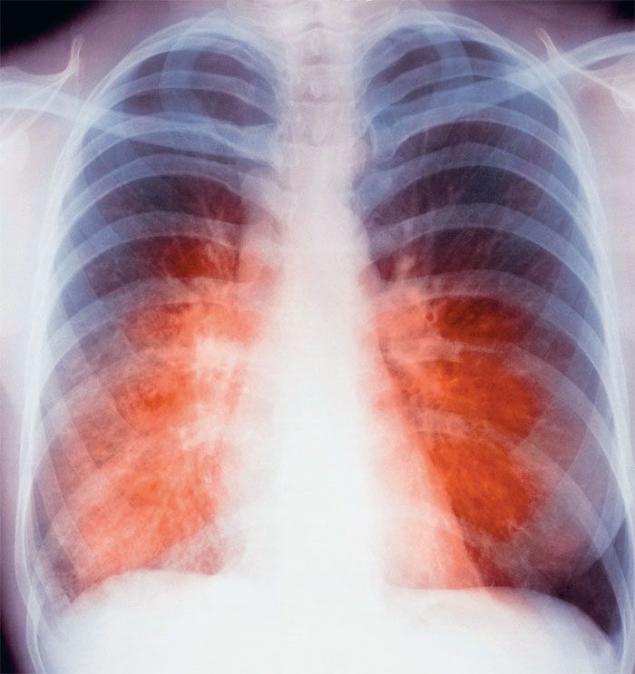
Tuberculosis
The disease often nests in the lungs, sometimes in the bones and other organs. Cough, weight loss, intoxication, night sweats.
What a victory. The victory over tuberculosis is quite conventional. Since Robert Koch in 1882 discovered the causative agent - Mycobacterium Mycobacterium tuberculosis, - have passed 130 years. The first vaccine created in the Institute Pasteur in 1921 and used until now. It is that of BCG, which is grafted newborn. The extent of its protection is poor and inexplicable varies from country to country, from clinic to clinic until the complete uselessness.
The real breakthrough came in 1943, when Selman Waksman discovered streptomycin - the first antibiotic effective against tuberculosis. Waxman - another Ukrainian Jewish immigrant, who left in 1910 in the United States. Incidentally, the term "antibiotic" was introduced by him. Streptomycin is used since 1946 with great success, for which Waxman gave the Nobel Prize. But after a few years it had tuberculosis that are resistant to the drug, and now all these antibiotics can not cure.
In the 60s there was rifampicin, which has been successfully treated so far. On average, 87% of patients in whom this diagnosis was the first time, cured of tuberculosis. This, of course, is very different from the beginning of the past and all of the last century, when the doctor wrote: "Pulmonary consumption (tuberculosis) - the most common and the most common disease." In the XIX century one in seven Europeans died of consumption, and in less developed countries the statistics simply does not exist.
TB is now curable in principle. There are schemes and anti-microbial agents, does not help if the first-line therapy, prescribed a backup ... But! View statistics of WHO for the year 2012: 8, 6 million TB patients, 1, 43 million have died. And so from year to year.
In Russia, everything is worse: in the 90s began an uncontrolled increase in the incidence, which reached a peak in 2005. We morbidity and mortality in several times higher than in any developed country. Every year from tuberculosis in the Russian die about 20 thousand. Man. And yet - we are third in the world in so-called multi-drug resistance. These types of bacteria that are not treated first-line drugs, on average in the world are 3, 6%. We have - 23%. And 9% are not treated, and second-line drugs. That die.
Blame the system of Health: patients treated with non-standard schemes, with a stock - for a long time put in the hospital. And so it is impossible to microbes: they are modified and become immune to the drugs. The hospital also forms gladly move to the neighbors in the ward. As a result, all the countries of the former Soviet Union - the main supplier of the world resistant tuberculosis.
Today, the WHO adopted a program of TB. In less than 20 years, doctors have reduced mortality by 45%. Russia in recent years, too, came to, and stopped amateur took the standard treatment protocols. The world is now experiencing 10 vaccines against tuberculosis and 10 new products. Nevertheless tuberculosis - a disease number two after HIV.

Leprosy
The disease is known to have leprosy - from the "distort, deform." Called Mycobacterium Mycobacterium leprae, related tuberculosis. It affects the skin, nervous system, mutilates man. It leads to death.
What a victory. Even now, the thought of accidental infection of leprosy in any of us a fair amount of injected dose of adrenaline in the blood. And so it was - for some reason, the disease inspired people to dread. Perhaps its slow and inevitable. Leprosy develops from three to forty years. Steps of the Commander by microbes.
Bypass with lepers, respectively: the early Middle Ages were packed into a leper colony, which in Europe were tens of thousands, made a symbolic burial with the words: "You're not alive, you are dead to us all", forced to notify currently bell and rattle, killed during the Crusades , castrated, and so on. d.
Bacteria discovered the Norwegian physician Gerhard Hansen in 1873. Her long to cultivate is a man, and it was necessary to find a cure. Eventually Sheppard became an American breed bacteria in the soles of the feet of laboratory mice. Next technique perfected, and then found another kind, except for the man who strikes leprosy: dasypus.
Out of leprosy march the same things and have many infections: antibiotic. In 40-ies of XX century it appeared dapsone, and in the 60s - rifampicin and clofazimine. These three drugs and are now in the course of treatment. The bacterium was unusually docile, do not develop a mechanism of resistance: that death is not in vain in the Middle Ages was called lazy.
Chief antibiotic - rifampicin, it opened the Italians Piero Sensi Timbay and Maria Theresa in 1957. They were delighted by the French gangster film Rififi, whose name and called the drug. They release it to the death of bacteria in 1967.
In 1981, the WHO adopted a protocol of treatment of leprosy: dapsone, rifampicin, clofazimine. Six months or a year, depending on the injury. Ambulatory.
Today, according to WHO statistics, suffer from leprosy mainly in India, Brazil, Indonesia, Tanzania. Last year it was hit by 182 thousand. Man. Each year, this number decreases. For comparison: in 1985, suffered from leprosy more than five million.
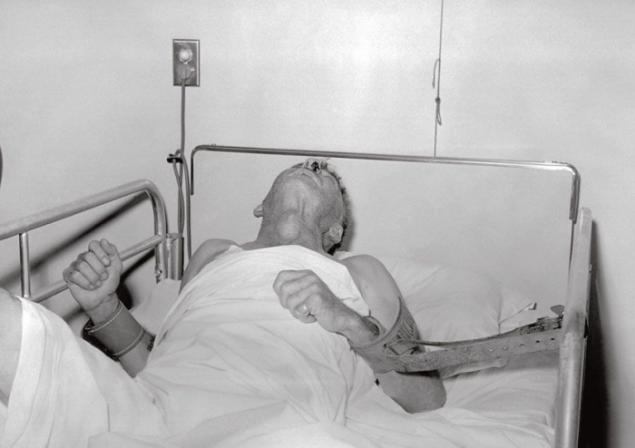
Rabies
©
Smallpox
The disease is caused by the variola virus is transmitted from person to person by droplet infection. Patients covered by a rash, passing in as the ulcers on the skin and mucous internal organs. Mortality, depending on the virus strain, from 10 to 40 (sometimes even 70) percent.
What a victory. Smallpox - the only infectious disease completely annihilation of mankind. The history of struggle against it has no analogues.
It is not known how and when the virus began to torment people, but a few thousand years of its existence can vouch. First time rolls smallpox epidemics, but in the Middle Ages, has registered among people on a permanent basis. Only in Europe have died from it by half a million people a year.
Fight tried. Sharpness Indians in VIII century have realized that smallpox get sick only once in a lifetime, and then in humans produces immunity to the disease. Invented Variolation - infected from healthy patients with mild: rubbed pus from bubbles in the skin, in the nose. In Europe Variolation brought in the XVIII century.
But first, this vaccine was dangerous from her dying every fiftieth patient. Secondly, this virus infects people, the doctors themselves supported foci. In general, the thing is so controversial that some countries, such as France, it is officially banned.
May 14, 1796 English physician Edward Jenner rubbed in two cuts on the skin year-old boy, James Phipps contents bubbles with hands peasant Sarah white salmon. Sarah was ill with cowpox - a benign disease transmitted from cattle to people. July 1 doctor instilled in the boy smallpox, and smallpox did not catch on. From that time I began the story of the destruction of smallpox in the world.
Vaccinations vaccinia became practiced in many countries, and the term "vaccine" was introduced by Louis Pasteur - from the Latin vacca, «a cow." Nature gave people vaccinated: vaccinia virus provokes an immune response of the body as well as the variola virus.
The final plan for the destruction of smallpox in the world to develop Soviet doctors, and took it to the Assembly of the World Health Organization in 1967. This is something that the Soviet Union can bring his undoubted asset along with the flight of Gagarin and the victory over Nazi Germany.
By the time the foci of smallpox remained in Africa, Asia and several countries in Latin America. The first stage was the most expensive but also the most simple - vaccinated more people. The rate hit. In 1974, India was 188 thousand patients, and in 1975 - no, the last case was registered on May 24.
The second and final stage of the struggle - a search for a needle in a haystack. It was necessary to discover and suppress the individual pockets of the disease and to make sure that does not suffer from smallpox no one billions living on Earth.
Caught sick world. In Indonesia, we paid 5,000 rupees each, who will lead the patient to the doctor. In India, for it gave a thousand rupees, which is several times greater than the monthly earnings of the peasant. In Africa, the Americans conducted an operation "Crocodile": one hundred mobile teams in helicopters scoured the remote places like the ambulance. In 1976, the family of nomads out of 11 people infected with smallpox, hunted hundreds of medical helicopters and airplanes - find them somewhere on the border of Kenya and Ethiopia.
Oct. 22, 1977 in the town of Brand in southern Somalia to the doctor a young man complained of a headache and temperature. At first, he was diagnosed with "malaria", and a few days later - "chicken pox". However, WHO staff, examined the patient, found that he had smallpox. This was the last case of smallpox infection from a natural focus on the planet.
May 8, 1980 at the 33th session of the WHO officially declared smallpox eradicated in the world.
Today, viruses are found only in two laboratories: in Russia and the United States, the question of their destruction is postponed until 2014.

Plague
The disease caused by the bacterium Yersinia pestis Yersinia pestis. There are two main forms of plague: bubonic and pneumonic. The first affects the lymph nodes at the second - light. Without treatment a few days begins fever, sepsis, in most cases, death occurs.
What a victory. "The first case recorded July 26, 2009. The patient addressed to the doctor in critical condition and died on July 29th. 11 people who had contact with patients hospitalized with symptoms of fever, two of them died, the rest feel satisfactory "- something like this message from China, now looks information on outbreaks of the plague.
Message from any European city in 1348 would look like this: "In Avignon pestilence struck all, tens of thousands of them no survivors. The corpses from the streets to clean up non-who. " Total in the world during that pandemic killed between 40 and 60 million people.
The planet has experienced three pandemics plague "Justinian" 551-580 years, the "black death" 1346-1353 pandemic years and the late XIX - early XX century. Periodically flashed and local epidemics. With fighting disease and quarantine - in the era of late dobakterialnuyu - disinfecting dwellings carbolic acid.
The first vaccine at the end of the XIX century by Vladimir Khavkin - man fantastic biography, Odessa Jewish student Mechnikov, former Volya, three stints in prison and expelled from the policies of the University of Odessa. In 1889, after Mechnikov, he emigrated to Paris, where he got a job as a librarian at first, and then an assistant at the Institut Pasteur.
Khavkin vaccine doses used by tens of millions around the world up to 40-ies of XX century. In contrast to the smallpox vaccine, it can not destroy the disease, and the results were much worse: it reduces the incidence of 2-5 times, and the mortality rate at 10, but it is still used because there was nothing else.
This treatment appeared only after the Second World War, when Soviet doctors svezheizobretenny streptomycin used in the liquidation of the plague in Manchuria in the years 1945-1947.
Actually now used against plague streptomycin, all the same, and the population in the foci were immunized with a live vaccine developed in the 30s.
Today reported annually to 2, 5 thousand. Cases of plague. The mortality rate - 5.10%. For decades, no epidemics, no major outbreaks. It is difficult to say how serious role in this is the actual treatment, and how - a system to identify patients and their insulation. Because plague before people leave for decades.

Cholera
The disease of dirty hands. Cholerae Vibrio cholerae Cholera is ingested with contaminated water or through contact with secretions of patients. The disease often does not develop at all, but 20% of infected people suffer from diarrhea, vomiting and dehydration.
What a victory. The disease was terrible. During the third pandemic of cholera in Russia in 1848, according to official statistics, noted 1,772,439 cases, of which 690 150 deaths. Flashed cholera riots when frightened people burned the hospital, believing doctors poisoners.
That's what Nikolai Leskov wrote: "When in the summer of 1892, at the end of the nineteenth century, there was cholera in the country, immediately there were the differences of opinion that we should do. The doctors said that it is necessary to kill a comma, and the people thought that it is necessary to kill the doctor. I should add that people are not the only way, "thought", but he tried and bring it into effect. Several doctors who tried to kill a comma for a better use of the case, were themselves killed. " Comma - Vibrio cholerae is open by Robert Koch in 1883.
Before the advent of antibiotic treatment of severe cholera existed, but still the same Vladimir Khavkin created in 1892 in Paris, very decent of warmed vaccine bacteria.
He experienced it for yourself and three friends, the People emigrants. Hawking decided that even though he is from Russia and escaped, but the vaccine has to help. If only allowed back. A letter with a proposal to establish a free vaccination was signed by Pasteur and Khavkin sent him curator of Russian science Prince Alexander of Oldenburg.
In Russia Khavkin, as usual, was not allowed, as a result, he went to India and in 1895 released a report on 42 thousands vaccinated and reducing mortality by 72%. Now in Bombay have Khavkin Institute (Haffkine Institute), what everyone can see it with the appropriate site. A vaccine, although the new generation has so far proposed by WHO as the main means of cholera outbreaks in it.
Today, every year several hundred thousand registered cases of cholera in endemic areas. In 2010, most cases were in Africa and Haiti. Mortality - 1, 2%, much lower than a century ago, and it is a merit of antibiotics. However, the main thing - prevention and hygiene.

Ulcer
Disease lesions of the gastric mucosa and duodenal ulcer by the action of acid. Affecting up to 15% of people on the planet.
What a victory. The ulcer has always been considered a chronic disease: escalate - to receive medical treatment, waiting for the next exacerbation. And it was treated, respectively, reducing the acidity in the stomach.
Until two Australians in the early 80-ies of the last century, medicine has not turned so that is still at seminars opponents tear each other to shreds. (By the way, this is a common phenomenon in medicine: the introduction of a new treatment had not passed without controversy rigid. Fifty years after the widespread use of vaccinia virus, for example, has published the cartoons - people with horns growing after vaccination cowpox.)
Robin Warren worked as a pathologist at the Royal Perth Hospital in. For many years he molested medical statements that the stomachs of ulcer patients, he finds a colony of bacteria. The doctors ignored him, replying that no acid bacteria to multiply can not. Maybe he would have surrendered if not stubborn young intern Barry Marshall, who came to Warren with a proposal to cultivate bacteria and then prove their relationship with the ulcer.
The experiment from the beginning is not specified: the microbes in test tubes did not grow. Accidentally left them unattended for a long time - were the Easter holidays. And when the researchers went back to the lab, they found the colony grew. Marshall put the experiment spread the bacteria in meat broth, and drank it down with gastritis. He cure drug bismuth and the antibiotic metronidazole, completely destroying bacteria in the body. Dubbed the bacterium Helicobacter pylori.
It was also found that Helicobacter infected half to three-quarters of all humanity, but not all of it causes ulcers.
Marshall was extremely punching man, he managed to break the resistance of the medical community, who are used to that ulcer patients - the patient life. In 2005, Australians have received for his discovery of the Nobel Prize.
Today, the main circuit ulcer treatment is to destroy Helicobacter pylori antibiotics. However, it appeared that the plague may be caused by other factors, such as certain medications. About what percentage of all cases connected with bacteria, still argue.

Tuberculosis
The disease often nests in the lungs, sometimes in the bones and other organs. Cough, weight loss, intoxication, night sweats.
What a victory. The victory over tuberculosis is quite conventional. Since Robert Koch in 1882 discovered the causative agent - Mycobacterium Mycobacterium tuberculosis, - have passed 130 years. The first vaccine created in the Institute Pasteur in 1921 and used until now. It is that of BCG, which is grafted newborn. The extent of its protection is poor and inexplicable varies from country to country, from clinic to clinic until the complete uselessness.
The real breakthrough came in 1943, when Selman Waksman discovered streptomycin - the first antibiotic effective against tuberculosis. Waxman - another Ukrainian Jewish immigrant, who left in 1910 in the United States. Incidentally, the term "antibiotic" was introduced by him. Streptomycin is used since 1946 with great success, for which Waxman gave the Nobel Prize. But after a few years it had tuberculosis that are resistant to the drug, and now all these antibiotics can not cure.
In the 60s there was rifampicin, which has been successfully treated so far. On average, 87% of patients in whom this diagnosis was the first time, cured of tuberculosis. This, of course, is very different from the beginning of the past and all of the last century, when the doctor wrote: "Pulmonary consumption (tuberculosis) - the most common and the most common disease." In the XIX century one in seven Europeans died of consumption, and in less developed countries the statistics simply does not exist.
TB is now curable in principle. There are schemes and anti-microbial agents, does not help if the first-line therapy, prescribed a backup ... But! View statistics of WHO for the year 2012: 8, 6 million TB patients, 1, 43 million have died. And so from year to year.
In Russia, everything is worse: in the 90s began an uncontrolled increase in the incidence, which reached a peak in 2005. We morbidity and mortality in several times higher than in any developed country. Every year from tuberculosis in the Russian die about 20 thousand. Man. And yet - we are third in the world in so-called multi-drug resistance. These types of bacteria that are not treated first-line drugs, on average in the world are 3, 6%. We have - 23%. And 9% are not treated, and second-line drugs. That die.
Blame the system of Health: patients treated with non-standard schemes, with a stock - for a long time put in the hospital. And so it is impossible to microbes: they are modified and become immune to the drugs. The hospital also forms gladly move to the neighbors in the ward. As a result, all the countries of the former Soviet Union - the main supplier of the world resistant tuberculosis.
Today, the WHO adopted a program of TB. In less than 20 years, doctors have reduced mortality by 45%. Russia in recent years, too, came to, and stopped amateur took the standard treatment protocols. The world is now experiencing 10 vaccines against tuberculosis and 10 new products. Nevertheless tuberculosis - a disease number two after HIV.

Leprosy
The disease is known to have leprosy - from the "distort, deform." Called Mycobacterium Mycobacterium leprae, related tuberculosis. It affects the skin, nervous system, mutilates man. It leads to death.
What a victory. Even now, the thought of accidental infection of leprosy in any of us a fair amount of injected dose of adrenaline in the blood. And so it was - for some reason, the disease inspired people to dread. Perhaps its slow and inevitable. Leprosy develops from three to forty years. Steps of the Commander by microbes.
Bypass with lepers, respectively: the early Middle Ages were packed into a leper colony, which in Europe were tens of thousands, made a symbolic burial with the words: "You're not alive, you are dead to us all", forced to notify currently bell and rattle, killed during the Crusades , castrated, and so on. d.
Bacteria discovered the Norwegian physician Gerhard Hansen in 1873. Her long to cultivate is a man, and it was necessary to find a cure. Eventually Sheppard became an American breed bacteria in the soles of the feet of laboratory mice. Next technique perfected, and then found another kind, except for the man who strikes leprosy: dasypus.
Out of leprosy march the same things and have many infections: antibiotic. In 40-ies of XX century it appeared dapsone, and in the 60s - rifampicin and clofazimine. These three drugs and are now in the course of treatment. The bacterium was unusually docile, do not develop a mechanism of resistance: that death is not in vain in the Middle Ages was called lazy.
Chief antibiotic - rifampicin, it opened the Italians Piero Sensi Timbay and Maria Theresa in 1957. They were delighted by the French gangster film Rififi, whose name and called the drug. They release it to the death of bacteria in 1967.
In 1981, the WHO adopted a protocol of treatment of leprosy: dapsone, rifampicin, clofazimine. Six months or a year, depending on the injury. Ambulatory.
Today, according to WHO statistics, suffer from leprosy mainly in India, Brazil, Indonesia, Tanzania. Last year it was hit by 182 thousand. Man. Each year, this number decreases. For comparison: in 1985, suffered from leprosy more than five million.

Rabies
©





